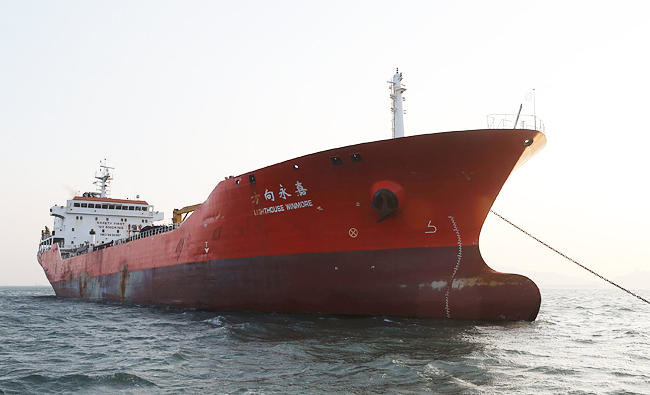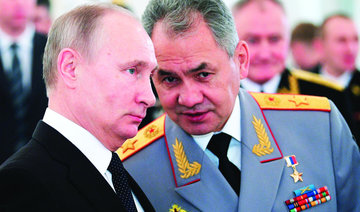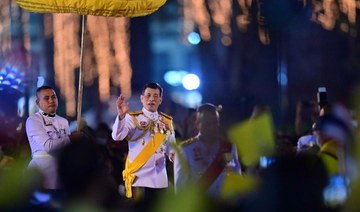LONDON/MOSCOW: Russian tankers have supplied fuel to North Korea on at least three occasions in recent months by transferring cargoes at sea, according to two senior Western European security sources, providing an economic lifeline to the secretive Communist state.
The sales of oil or oil products from Russia, the world’s second biggest oil exporter and a veto-wielding member of the United Nations Security Council, breach UN sanctions, the security sources said.
The transfers in October and November indicate that smuggling from Russia to North Korea has evolved to loading cargoes at sea since Reuters reported in September that North Korean ships were sailing directly from Russia to their homeland.
“Russian vessels have made ship-to-ship transfers of petrochemicals to North Korean vessels on several occasions this year in breach of sanctions,” the first security source, who spoke on condition of anonymity, told Reuters.
A second source, who independently confirmed the existence of the Russian ship-to-ship fuel trade with North Korea, said there was no evidence of Russian state involvement in the latest transfers.
“There is no evidence that this is backed by the Russian state but these Russian vessels are giving a lifeline to the North Koreans,” the second European security source said.
The two security sources cited naval intelligence and satellite imagery of the vessels operating out of Russian Far Eastern ports on the Pacific but declined to disclose further details to Reuters, saying it was classified.
Russia’s Foreign Ministry and the Russian Customs Service both declined to comment when asked on Wednesday if Russian ships had supplied fuel to North Korean vessels. The owner of one ship accused of smuggling oil to North Korea denied any such activity.
The US State Department, in a statement, called on Russia and other UN members to “strictly implement” sanctions on North Korea and to work “more closely together to shut down UN-prohibited activities, including ship-to-ship transfers of refined petroleum and the transport of coal from North Korea.”
The latest report came as China, responding on Friday to criticism from US President Donald Trump, denied it had illicitly shipped oil products to North Korea.
North Korea relies on imported fuel to keep its struggling economy functioning. It also requires oil for its intercontinental ballistic missile and nuclear program that the United States says threatens the peace in Asia.
“The vessels are smuggling Russian fuel from Russian Far Eastern ports to North Korea,” said the first security source, who spoke on condition of anonymity.
Reuters was unable to independently verify that the vessels had transferred fuel to North Korean vessels, whether the Russian state knew about the sales or how many Russian vessels were involved in the transfers. It was also unclear how much fuel may have been smuggled.
Ship satellite positioning data consulted by Reuters and available on Reuters Eikon shows unusual movements by some of the Russian vessels named by the security sources including switching off the transponders which give a precise location.
The security sources said the Russian-flagged tanker Vityaz was one vessel that had transferred fuel to North Korean vessels.
The Vityaz left the port of Slavyanka near Vladivostok in Russia on Oct. 15 with 1,600 tons of oil, according to Russian port control documents.
Documents submitted by the vessel’s agent to the Russian State Port Control authority showed its destination as a fishing fleet in the Japan Sea. Shipping data showed the vessel switched off its transponder for a few days as it sailed into open waters.
According to the European security sources, the Vityaz conducted a ship-to-ship transfer with the North Korean Flagged Sam Ma 2 tanker in open seas during October.
Reuters could not independently verify the transfer as ship tracking data showed that the Sam Ma 2 had turned off its transponder from the start of August.
The owner of the Russian vessel denied any contact with North Korean vessels but also said it was unaware that the vessel was fueling fishing boats.
Yaroslav Guk, deputy director of the tanker’s owner, Vladivostok-based Alisa Ltd, said the vessel had no contacts with North Korean vessels.
“Absolutely no, this is very dangerous,” Guk told Reuters by telephone. “It would be complete madness.”
When contacted a second time, Guk said the vessel did not have any contacts with North Korean ships and that he would not answer further questions.
An official at East Coast Ltd, the vessel’s transport agent, declined to comment.
Two other Russian flagged tankers made similar journeys between the middle of October and November, leaving from the ports of Slavyanka and Nakhodka into open seas where they switched off their transponders, shipping data showed.
In September, Reuters reported that at least eight North Korean ships that left Russia loaded with fuel this year headed for their homeland despite declaring other destinations, a ploy that US officials say is often used to undermine sanctions.
A Russian shipping source with knowledge of Far Eastern marine practices said North Korean vessels had stopped loading fuel in Russia’s Far Eastern ports but that fuel is delivered at sea by tankers using ship-to-ship transfers, or even by fishing vessels.
China on Friday denied reports it had been illicitly selling oil products to North Korea in violation of UN sanctions, after US President Donald Trump said he was unhappy that China had allowed oil to reach the isolated nation.
China’s denial came a day after it blocked a US effort at the United Nations to blacklist six ships Washington believes had engaged in illicit trade with North Korea, a UN Security Council diplomat said.
According to documents seen by Reuters this month, the United States had proposed that the UN Security Council blacklist 10 ships for illicit trade with North Korea.
It accused the vessels of “conducting illegal ship-to-ship transfers of refined petroleum products to North Korean vessels or illegally transporting North Korean coal to other countries for exports.”
Three North Korean ships among the 10 were blacklisted, along with a Panama-registered vessel.
Russian tankers fueled North Korea via transfers at sea — sources
Russian tankers fueled North Korea via transfers at sea — sources

Sri Lanka says 16 citizens killed fighting in Ukraine war

- Soldiers from Sri Lanka’s regional neighbors India and Nepal have also signed up to fight since last year
- Sri Lanka opened an inquiry last week into the recruitment of its citizens for the conflict
Tens of thousands of Russian soldiers have been killed in Ukraine since the invasion began more than two years ago, and Moscow has been on a global quest for more troops.
Soldiers from Sri Lanka’s regional neighbors India and Nepal have also signed up to fight since last year, with several confirmed deaths in combat from citizens of both countries.
Sri Lanka opened an inquiry last week into the recruitment of its citizens for the conflict that has since identified the participation of 288 retired soldiers from the island nation, deputy defense minister Pramitha Tennakoon said.
“We have confirmed information about 16 who have been killed,” he told reporters in Colombo.
Tennakoon did not say which side of the conflict the soldiers had been fighting on.
But ruling party lawmaker Gamini Waleboda told parliament on Monday that most had been recruited to fight alongside the Russian army.
Those who joined had been duped with promises of high salaries and falsely told they would be given non-combat roles, Waleboda said.
Tennakoon said the recruitment of Sri Lankans was being treated as a human trafficking enterprise and urged military officers not to fall prey to the recruitment drive.
The Sri Lankan government was also in talks with both the Ukrainian and Russian foreign ministries to track down Sri Lankans in the two countries and bring them back safely.
“This is a delicate issue,” Tennakoon said. “We are friends with Russia, we are friends with Ukraine. Both are important for us so we are talking to the foreign ministries to get our people back safely.”
Complaints began pouring in from relatives after the defense ministry established its probe last week to collect information on those who had traveled to both countries to join the war effort.
Sri Lanka has repeatedly warned its citizens against traveling to Russia or Ukraine to join the fighting.
But there are no restrictions on Sri Lankans traveling abroad and large numbers have left in the wake of an unprecedented economic crisis in mid-2022.
Police arrested two retired army officers, including a major general, last week for illegally acting as recruiting agents for Russian mercenary firms.
India and Nepal have also confirmed that numerous citizens of those countries had been recruited to fight alongside the Russian army over the past year.
At least 19 Nepalis had been killed in combat, according to figures from the Himalayan republic published in March.
Russia’s army held off a much-hyped Ukrainian counter-offensive last year and it has since made gains as Kyiv struggles with ammunition and manpower shortages.
Russia suspends two airports’ traffic over drone threat

- Ukrainian forces have in recent weeks escalated aerial attacks on Russian border regions
- Russia earlier said it had neutralized 17 Ukrainian drones overnight
MOSCOW: Russia said Wednesday that a major airport near the city of Kazan, 1,000 kilometers (620 miles) from Ukraine, had been temporarily closed after the region was targeted by a Ukrainian attack drone.
Ukrainian forces have in recent weeks escalated aerial attacks on Russian border regions but have also been able to strike targets deep inside Russian territory.
The defense ministry said it had downed a Ukrainian drone over the central region of Tatarstan but did not specify what was the target of the attack.
Two airports in the region, including in the major hub of Kazan, were temporarily closed around the same time, Russian aviation body, Rosaviatsia announced.
“To ensure the safety of civil aircraft, temporary restrictions have been imposed on the work of two airports in Tatarstan — Kazan and Nizhnekamsk,” state news agencies cited the agency as saying.
Russia earlier said it had neutralized 17 Ukrainian drones overnight as Kyiv targeted a fuel depot in the southern city of Rostov, home to Moscow’s military headquarters for its operation in Ukraine.
Russian aerial defense systems intercepted and destroyed 17 drones across several border areas, as well as 10 ATACMS missiles over the annexed Crimean peninsula, the defense ministry said.
Two drones caused explosions at a fuel depot in Rostov without setting off a fire or wounding anyone, local governor Vasily Golubev said on Telegram.
More than two years into the conflict on its territory with its larger and more heavily-armed neighbor, Ukraine has regularly targeted Russian energy facilities and fuel supplies.
Kyiv argues that these attacks are justified as the facilities are used to supply the Russian army.
Ukraine has vowed to take the battle to Russian soil after suffering massive destruction on its territory from more than two years of bombardments.
UN launches probe into first international staff killed by unidentified strike in Rafah

- Retired Indian army officer Waibhav Anil Kale was on route to European Hospital when killed
- Kale was working with the UN Department of Safety and Security, his colleague also injured
NEW DELHI: The United Nations has launched an investigation into an unidentified strike on a UN car in Rafah on Monday that killed its first international staff in Gaza since Oct. 7, a spokesperson for the UN Secretary General said.
The staff member, a retired Indian Army officer named Waibhav Anil Kale, was working with the UN Department of Safety and Security and was on route to the European Hospital in Rafah along with a colleague, who was also injured in the attack.
Israel has been moving deeper into Rafah in southern Gaza, where more than a million people had sought shelter, and its forces pounded the enclave’s north on Tuesday in some of the fiercest attacks in months.
Israel’s international allies and aid groups have repeatedly warned against a ground incursion into Rafah, where many Palestinians fled, and Israel says four Hamas battalions are holed up. Israel says it must root out the remaining fighters.
In a statement on Monday after Kale’s death, UN Secretary General Antonio Guterres reiterated an “urgent appeal for an immediate humanitarian ceasefire and for the release of all hostages,” saying the conflict in Gaza was continuing to take a heavy toll “not only on civilians, but also on humanitarian workers.”
Palestinian health authorities say Israel’s ground and air campaign in Gaza since Oct. 7 has killed more than 35,000 people and driven most of the enclave’s 2.3 million people from their homes.
His deputy spokesperson Farhan Haq said on Tuesday the UN has established a fact-finding panel to determine the responsibility for the attack.
“It’s very early in the investigation, and details of the incident are still being verified with the Israeli Defense Force,” he said.
There are 71 international UN staff members in Gaza currently, he said.
In its only comment on the matter yet, India’s mission to the UN confirmed Kale’s identity on Tuesday, saying it was “deeply saddened” by his loss.
Israel, which launched its Gaza operation after an attack on Oct. 7 by Hamas-led gunmen who killed some 1,200 people and took more than 250 hostages, according to its tallies, has ordered civilians to evacuate parts of Rafah.
The main United Nations aid agency in Gaza, UNRWA estimates some 450,000 people have fled the city since May 6. More than a million civilians had sought refuge there.
India’s Modi denies stoking Hindu-Muslim divisions to win election, files nomination

- Modi began campaign by showcasing his economic record, governance and popularity
- Changed tack after the first phase to accuse opposition Congress of being pro-Muslim
NEW DELHI: Indian Prime Minister Narendra Modi defended himself against criticism that he is stoking divisions between Hindus and Muslims to win national elections as he filed his nomination on Tuesday for re-election from one of Hinduism’s holiest cities.
India began voting April 19 in the seven-phase election in which Modi, 73, is seeking to be the second prime minister to win a third straight term since independence leader Jawaharlal Nehru.
Although Modi began his campaign by showcasing his economic record, governance and popularity, he has changed tack after the first phase to accuse the main opposition Congress party of being pro-Muslim.
Analysts say this was likely aimed at firing up the base of his Hindu nationalist Bharatiya Janata Party after a low turnout in the first phase sparked doubts that BJP and its allies could win the landslide that the party sought.
“I believe people of my country will vote for me,” Modi told broadcaster CNN-News18 in Varanasi, his parliamentary constituency in the northern state of Uttar Pradesh.
“The day I start talking about Hindu-Muslim (in politics) will be the day I lose my ability to lead a public life,” Modi said, speaking in Hindi. “I will not do Hindu-Muslim. That is my resolve.”
Modi’s critics often accuse him and BJP of targeting minority Muslims to please their hard-line voters, which he and the party deny.
While Hindus make up about 80 percent of India’s 1.4 billion people, it also has the world’s third-largest Muslim population of about 200 million.
Congress has complained to the Election Commission that Modi made “deeply objectionable” comments about Muslims in an April 21 speech, violating poll rules. The commission has sought a response from the BJP on the complaint.
In that speech, Modi accused Congress of planning to do a wealth concentration survey, seize properties and redistribute them, which Congress has denied.
He said at the time:
“During their (Congress) previous government, they said that Muslims have the first right on the wealth of the nation. That means, who will they redistribute this wealth to? They will give it those who have more children, to infiltrators.”
On Tuesday, Modi said he did not name any community in that speech, even as he continued to focus on the theme.
“I have neither said Hindu or Muslim. I have said you should have as many children as you can support,” Modi said.
Detained Thai monarchy reform activist dies after hunger strike

- Netiporn Sanesangkhom, was a member of the activist group Thaluwang, known for their bold and aggressive campaigns
- She is the first political activist in Thailand to have died after carrying on a partial hunger strike for 110 days
BANGKOK: A young activist in Thailand who went on a hunger strike after being jailed for advocating reform of the country’s monarchy system died Tuesday in a prison hospital, officials said. The death sparked fresh calls for reviewing the judicial process that allows political offenders accused of nonviolent offenses to be held for extended periods in prison ahead of being tried.
Netiporn “Bung” Sanesangkhom, 28, was a member of the activist group Thaluwang, known for their bold and aggressive campaigns demanding reform of the monarchy and abolition of the law that makes it illegal to defame members of the royal family. The group’s name can be loosely translated as “breaking through the palace,” a reference to its open criticism of Thailand’s monarchy.
She appears to be the first political activist in Thailand to have died after carrying on a partial hunger strike for 110 days while she was awaiting trial.
The Thailand branch of the human rights group Amnesty International described Netiporn’s death as “a shocking reminder that Thai authorities are denying activists their right to temporary release on bail and using detention to silence the peaceful expression of dissent.”
“This is a grim day for Thai society, highlighting the severe judicial harassment and the justice system’s failure to recognize basic human rights,” the group said. “Speaking out should not lead to death; it should inspire change.”
The popular opposition Move Forward party, which has also campaigned for reform of the monarchy, issued a statement saying that people should not be jailed for holding political opinions and that persons accused of political offenses should be granted bail.
Foreign diplomats and ambassadors from the US, UK, Canada, the EU and elsewhere offered their condolences after Netiporn’s death. German Ambassador Ernest Reichel wrote on social platform X: “My wish would be that political disagreements are not taken to such bitter and extreme consequences.”
Thailand’s monarchy until recent years was widely considered an untouchable, bedrock element of Thai nationalism. Criticism of the monarchy was taboo, and insulting or defaming key royal family members remains punishable by up to 15 years in prison under a lese majeste law, usually referred to as Article 112 of Thailand’s Criminal Code.
Student-led pro-democracy protests beginning in 2020 openly criticized the monarchy, leading to vigorous prosecutions under the law, which had previously been relatively rarely employed. Critics say the law is often wielded as a tool to quash political dissent.
The protest movement faded due to government harassment and the coronavirus pandemic, but Netiporn was one of more than 270 activists charged with the royal defamation law since the protests in 2020-21.
Netiporn suffered cardiac arrest early Tuesday morning, and medical teams spent several hours trying to resuscitate her. She was pronounced dead just before noon, according to a statement from the Corrections Department.
She had two charges of lese majeste pending against her, both of them involving conducting polls in public spaces in 2022 asking people’s opinion about the royal family, according to the group Thai Lawyers for Human Rights. Her release on bail was revoked in January due to her participation in a political rally last year.
Netiporn started her hunger strike after she was detained in January. The Corrections Department said she began eating and drinking water again after April 4. However, the human rights lawyer group’s latest update on her condition on April 25 said she was still fasting.
Two fellow jailed activists are also carrying out hunger strikes. Both are Thaluwang members who were also charged with lese majeste for agitating for reform of the monarchy, and they started their hunger strikes about a month after Netiporn.
Netiporn’s lawyers had applied for her to be transferred from the Central Corrections Hospital to Thammasat University Hospital but she was never granted a prolonged stay there for treatment, said her lawyer, Kritsadang Nutcharas. The authorities said they would establish the legal cause of death.
“Does it seem like there’s standard treatment in the Thai justice system when we compare what these kids are going through with their political charges and what some prominent adults have gone through?” Kritsadang said. He was making an apparent reference to former Prime Minister Thaksin Shinawatra, who returned from exile last year to serve a prison term in corruption-related cases but never spent a single night in jail on grounds of ill health.
At a candlelight vigil Tuesday night outside Bangkok’s Criminal Court, another activist facing lese majeste charges, Panusaya “Rung” Sitthijirawattanakul, decried the failure of Prime Minister Srettha Thavisin’s government to ease the plight of political prisoners.
“Do you need someone to die first before you think of doing something?” she said. “How many of us have to die before you start listening to us? We are not people to be scared of. We’re just ordinary people who are asking for something. So this is very brutal.”
Thaluwang has held high-profile protests calling not only for reform of the monarchy, but also changes in the justice system and an end to political persecution through the courts. It has also called for rejection of Thailand’s application to join the UN Human Rights Council.
Thailand announced its bid for a seat on the rights council for the 2025-2027 term after the current government took office last year, seeking to show its commitment to protect human rights. Critics charge that the reality of law enforcement in the country strongly contradicts its ambition to be recognized by the international community as a human rights defender.
Human Rights Watch has raised concerns over “the Thai government’s use of arbitrary arrest and pretrial detention to punish critics of the monarchy for their views,” which it says is a violation of their rights under international human rights law.















